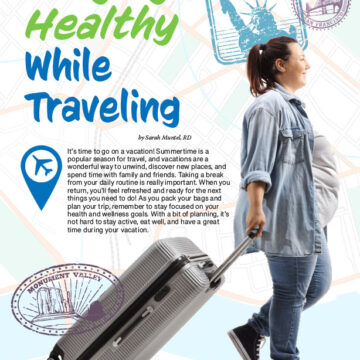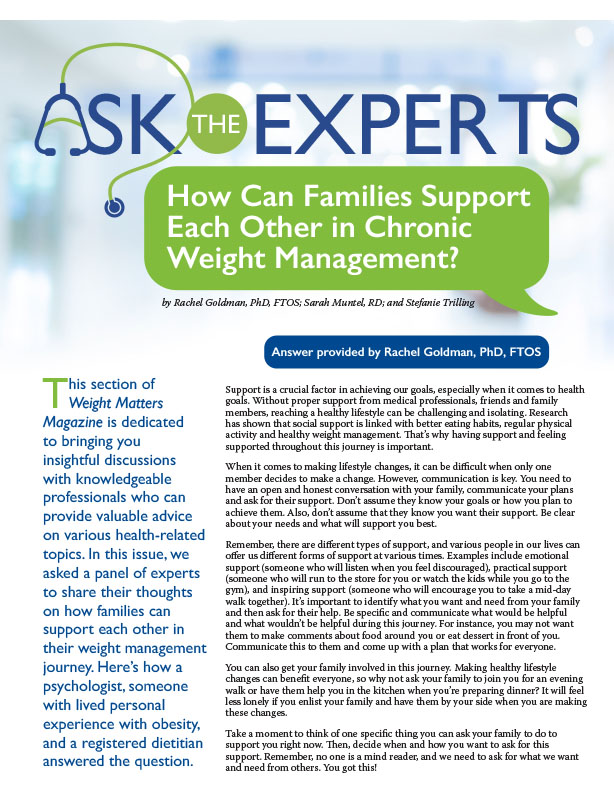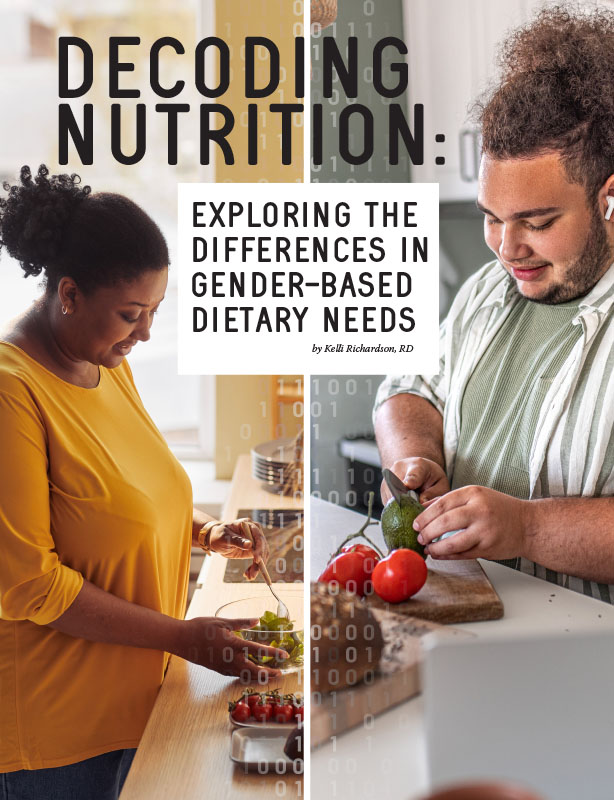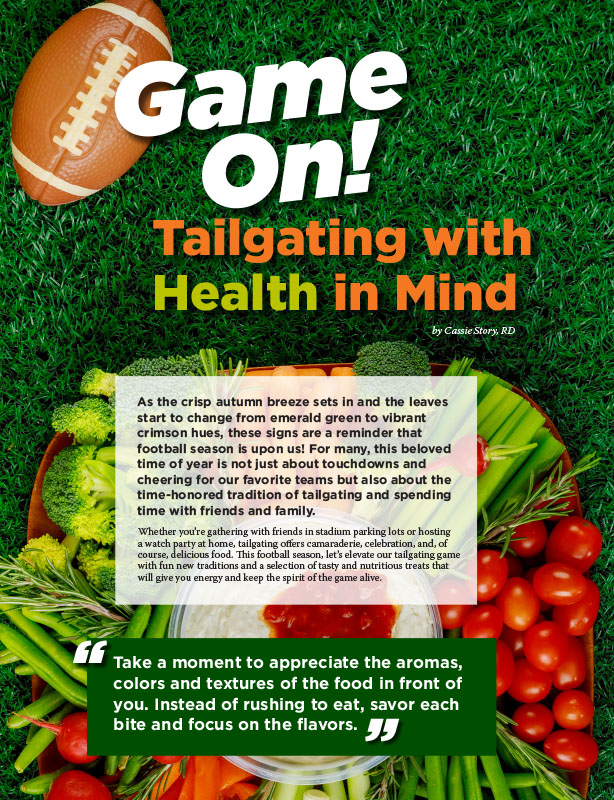5 Weight-loss Myths You Should Forget

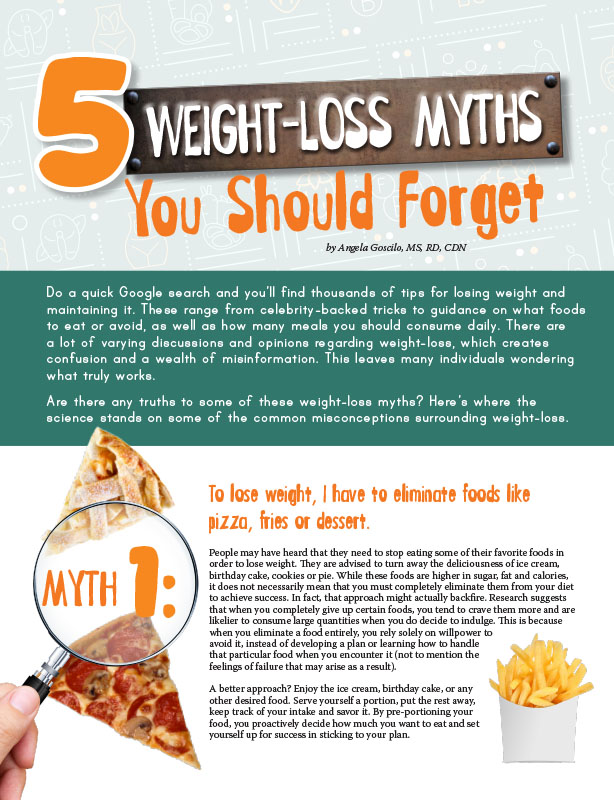
by Angela Goscilo, MS, RD, CDN
Summer 2023
Do a quick Google search and you’ll find thousands of tips for losing weight and maintaining it. These range from celebrity-backed tricks to guidance on what foods to eat or avoid, as well as how many meals you should consume daily. There are a lot of varying discussions and opinions regarding weight-loss, which creates confusion and a wealth of misinformation. This leaves many individuals wondering what truly works.
Are there any truths to some of these weight-loss myths? Here’s where the science stands on some of the common misconceptions surrounding weight-loss.
Myth 1: To lose weight, I have to eliminate foods like pizza, fries or dessert.
People may have heard that they need to stop eating some of their favorite foods in order to lose weight. They are advised to turn away the deliciousness of ice cream, birthday cake, cookies or pie. While these foods are higher in sugar, fat and calories, it does not necessarily mean that you must completely eliminate them from your diet to achieve success. In fact, that approach might actually backfire. Research suggests that when you completely give up certain foods, you tend to crave them more and are likelier to consume large quantities when you do decide to indulge. This is because when you eliminate a food entirely, you rely solely on willpower to avoid it, instead of developing a plan or learning how to handle that particular food when you encounter it (not to mention the feelings of failure that may arise as a result).
A better approach? Enjoy the ice cream, birthday cake, or any other desired food. Serve yourself a portion, put the rest away, keep track of your intake and savor it. By pre-portioning your food, you proactively decide how much you want to eat and set yourself up for success in sticking to your plan.
Myth 2: I must track every bite of food I eat to be successful.
Have you heard that tracking your food intake is essential for achieving weight-loss success? If so, you may feel tempted to strive for “perfect tracking” and meticulously record every single bite down to the exact gram. While you might be able to sustain this approach for a few days or even weeks, it is unlikely to be a viable long-term strategy. Tracking is certainly an important tool, but it does not have to be executed perfectly for it to yield positive results.
Research indicates that individuals who track their food are more likely to
lose weight, make healthier food choices and maintain their weight-loss. Recording what and how much is a means of enhancing your awareness. It can help you identify patterns in your eating habits, recognize moments when you reach for food, and even assist you in making informed decisions about what to eat.
Therefore, aim to track your food in a way that makes sense to you. Consider pre-tracking your meals on busy days or taking a picture of your food when you don’t have time to log it immediately. Consistency is the most important part of a weight-loss journey.
Myth 3: Carbs are bad.
With the rising popularity of low-carbohydrate diets, many individuals have embraced the notion that bread, pasta, rice and potatoes are unhealthy and lead to weight gain. Lately, there are many new products at the grocery store that are labeled as “keto-friendly,” and you may notice more options like cauliflower rice or lettuce wraps on menus. It can be challenging not to be influenced by the popularity of low-carb diets.
However, it’s important to remember that no one food or food group, including carbohydrates, can make you gain weight or stop you from losing weight. Carbohydrates are one of the three primary nutrients your body needs to work properly, and they give energy to your brain. They also have important vitamins, minerals, and fiber to keep your heart and gut healthy.
Carbs can be found in foods like bread and pasta, but they are also in fruits, starchy vegetables (like potatoes or corn), beans, peas and lentils. All of these foods can be part of a healthy diet and can help you lose weight.
Myth 4: Breakfast is the most important meal of the day.
Having breakfast has long been said to be the most important meal of the day, but that’s a lot of pressure to put on just one meal. Besides, science doesn’t fully support this claim. While breakfast gives you another chance to get important nutrients you might miss out on later, research shows that eating breakfast isn’t necessary for successfully losing weight.
However, research does show that people who eat regular breakfast may have a healthier body weight and are more likely to engage in healthier habits. Breakfast is an opportunity to get essential nutrients for good health, like protein and fiber. When you’re trying to lose weight, eating protein in the morning has been proven to help with weight loss.
So, what should you eat for breakfast? Start with a meal that has protein and fiber, like nonfat Greek yogurt with fruit or eggs and vegetables. But if you prefer to have your first meal later in the day, don’t worry, it won’t ruin your weight-loss progress.
Myth 5: Snacking will derail my weight-loss progress.
While snacking without thinking can slow down your weight-loss, planned snacks can actually help you in your journey to lose weight. Eating something every three to four hours can prevent you from becoming too hungry between meals, which often leads to overeating.
So, how can you include snacks in your day? Look for snacks that come in
pre-portioned sizes or make your own single servings. When it comes to choosing what to eat, try pairing a fruit or vegetable—which are full of fiber—with a source of protein. This combination of protein and fiber has been proven to keep you feeling full and satisfied.
Conclusion
Apart from these myths, there are many approaches that have been shown to be successful for weight loss. The key to maintaining your progress is not just reducing the amount of food on your plate, but also developing healthy eating and exercise habits that you can stick to over time. Remember, what works for someone else may not work for you, and that’s okay. There is no one-size-fits-all method for losing weight or achieving your health goals.
About the Author:
Angela Goscilo, MS, RD, CDN, is the Senior Manager of Nutrition at WeightWatchers® where she is responsible for ensuring everything is rooted in the latest nutrition science. She is a registered dietitian based in New York.
by Rachel Goldman, PhD, FTOS; Sarah Muntel, RD; and Stefanie Trilling Winter 2024 This section of Weight…
Read Articleby Kelli Richardson, RD You’ve probably heard the generic advice before: Eat your fruits and veggies. Limit…
Read Articleby Cassie Story, RD Fall 2023 As the crisp autumn breeze sets in and the leaves start…
Read Article




